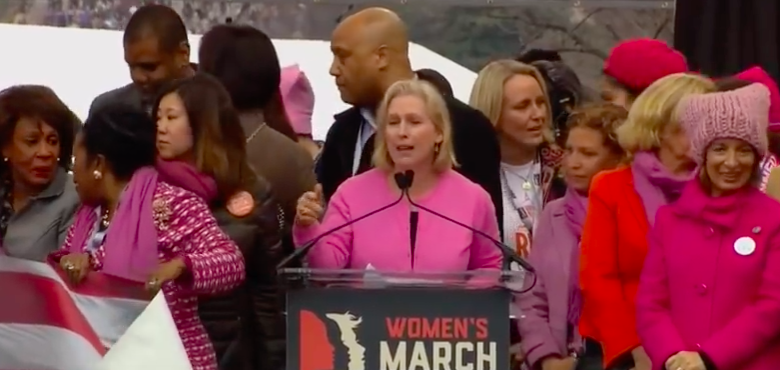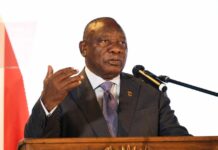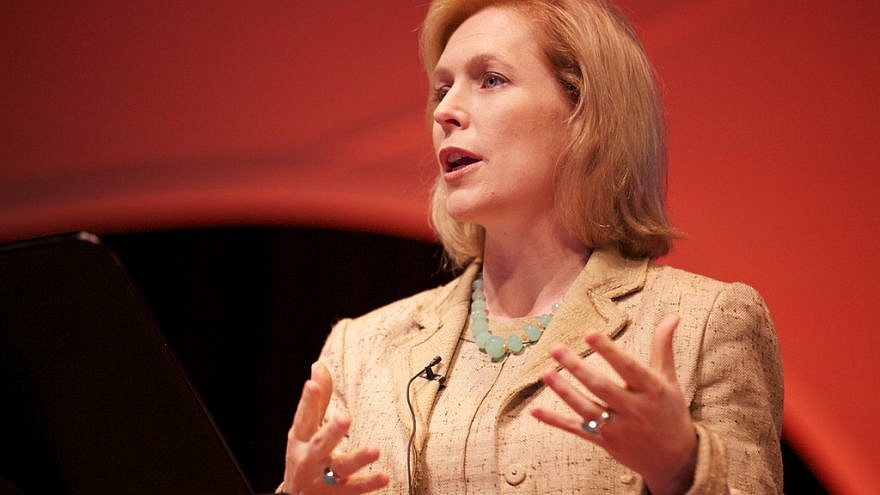Sen. Kirsten Gillibrand announced on Tuesday that she has set up an exploratory committee as she entered the 2020 Democratic primary for president.
From immigration to gun control and other issues, Gillibrand has flip-flopped on her stances. Some of those stances related to Israel are no exception, despite representing a state with the largest Jewish populationin the United States with almost 1.76 million.
Shifting stance on Iran nuclear program
In September 2009, she released a statement that the “Iranian regime’s word cannot be trusted, and a nuclear Iran cannot be tolerated,” only to support “an imperfect Iran deal” in 2015.
“I have decided to support this deal after closely reading the agreement, participating in multiple classified briefings, questioning Energy Secretary [Ernest] Moniz and other officials, consulting independent arms control experts, and talking with many constituents who both support and oppose this deal,” wrote Gillibrand.
The senator slammed U.S. President Donald Trump for withdrawing the United States from the accord in May 2018.
“By walking away from the agreement, the president has opened the door to Iran going back to developing a nuclear-weapons program,” she said. “This unilateral decision will cost us the ability to maintain a strong coalition holding Iran accountable and the ability to increase leverage and oversight with our European allies.”
Withdrawing support for anti-BDS legislation
In 2017, she withdrew her sponsorship of the bipartisan Israel Anti-Boycott Act, citing criticism of it from the American Civil Liberties Union that it would infringe of freedom of speech. The bill would have amended the Export Administration Act of 1979, forbidding American firms from partaking in the Boycott, Divestment and Sanctions (BDS) movement, including boycotts advocated by international organizations such as the United Nations.
Gillibrand has not reversed her stance on anti-BDS legislation and has repeatedly voted, along with most of her fellow Democrats, not to advance a recent bill that enables state and local governments in the United States to fight anti-Israel initiatives.

She spoke at the 2017 Women’s March, a movement whose top leaders have been associated with anti-Semitism, including support for Nation of Islam leader Louis Farrakhan, though her involvement was early on in its activism and had more to do with the general participants.
She did, however, pen a profile of the leaders, who were jointly listed as one of Time’s 100 most influential people in the world in 2017.
The Women’s March was the most inspiring and transformational moment I’ve ever witnessed in politics. It was a joyful day of clarity and a lightning bolt of awakening for so many women and men who demanded to be heard.
And it happened because four extraordinary women—Tamika Mallory, Bob Bland, Carmen Perez and Linda Sarsour—had the courage to take on something big, important and urgent, and never gave up. Because of their hard work, millions of people got off the sidelines, raised their voices and marched. The images of Jan. 21, 2017, show a diverse, dynamic America—striving for equality for all. The moment and movement mattered so profoundly because it was intersectional and deeply personal.
This is the rebirth of the women’s movement. These women are the suffragists of our time. And our movement isn’t going away—it’s just the beginning.
Mixed record on Israel
Moreover, Gillibrand called for restraint on both sides of the Israel-Hamas conflict amid the terrorist group launching rockets from Gaza into Israel in November 2018.
“The escalation in violence on the Israel-Gaza border is deeply disturbing, and I am relieved that Israel’s missile defense programs were able to avert civilian fatalities from this disgraceful terror attack. I urge calm so the situation does not further escalate, and I still remain hopeful for a long-term, peaceful solution to this tragic conflict,” she said. “But the only way we will accomplish that is through negotiations that create conditions for safety and economic security—not through rocket attacks or any other acts of terrorism.”
At a July 2017 town hall, she questioned whether Israeli Prime Minister Benjamin Netanyahu is committed to negotiations: “I am concerned that Prime Minister Netanyahu does not have a plan for peace and doesn’t have a vision for peace.”
“In our [2016] meeting [in Israel] with Prime Minister Netanyahu, the question we asked is, what is your vision for peace, and he didn’t have one,” she said.
“He just said my only hope is that I protect my people from rockets,” she added. “If you don’t have a vision, if you don’t have a plan, then it is never going to happen. And so we do need to require more of our world leaders, and I think a call to action to Israel’s government to have a plan for peace is really incumbent on all of us.”
Nonetheless, Gillibrand has condemned the prevalent anti-Israel bias at the United Nations.
In January 2017, she supported a Senate resolution to refute U.N. Security Council Resolution 2334, condemning Israeli neighborhoods in Judea and Samaria. The United States abstained from voting, thereby allowing it to pass.
The following April, Gillibrand signed a joint letter to U.N. Secretary General António Guterres, calling for the end of the world body’s animosity towards the Jewish state.
Whether Gillibrand will change her past stances, including on issues where she has already done a reversal, on the campaign trail will be something to watch.


























